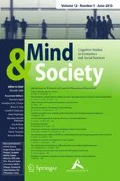Abstract
The mind-society problem deals with the relations between mental and social phenomena. The problem is crucial in the main methodologies of social sciences. The thesis of hermeneutics is that we can only understand but not explain the relationship between beliefs and social action because mental and social events are not natural events. The thesis of social holism is that social phenomena are emergent and irreducible to mental phenomena. The thesis of rational choice theory is that social phenomena are reducible to mental phenomena and this reduction is explained by unrealistic a priori principles of rationality. These theses depend on their different solutions to the following fundamental philosophical issues: the mind-body identity; the causal nature of social explanation; the realistic goal of science. A positive answer to these issues implies support of a different solution to the mind-society problem: social phenomena are conventional concepts and they can be reduced and explained in terms of realistic concepts describing the causal mechanisms of individual reasoning and decision-making. Cognitive psychology seems to supply us some initial tentative models to explain social action, but research into neuropsychology might be able to generate the proper causal representations of the relation between mind and action.
Bibliography
Anderson, J.A. & Rosenfeld, E. (1988)Neurocomputing: Foundations of Research (Cambridge, MIT Press).
Boudon, R. (1994)The Art of Self Persuasion (London, Polity Press).
Cheng, P.W. & Holyoak, K.J. (1985) Pragmatic Reasoning Schemas,Cognitive Psychology, 17, pp. 391–416.
Cheng, P.W. & Holyoak, K.J. (1989) On the natural selection of reasoning theories,Cognition, 33. pp. 285–313.
Churchland, P.M. (1979)Scientific realism and the plasticity of mind (Cambridge, Cambridge University Press).
Churchland, P.M. (1995)The Engine of Reason, The Seat of the Soul: A Philosophical Journey into the Brain (Cambridge, MIT Press).
Churchland, P.M. (1998) The neural Representation of the Social World, in P.A. Danielson (Ed.)Modelling Rationality, Morality and Evolution (Oxford, Oxford University Press).
Churchland, P.S. & Sejnowski, T. (1992)The Computational Brain (Cambridge, MIT Press).
Dennett, D. (1978)Brainstorms (Montgomery, Bradford Books).
Field, A. (1977) Logic meaning and conceptual role,Journal of Philosophy, 74, pp. 379–408.
Fodor, J. (1975)The language of thought (New York, Cromwell).
Fodor, J. (1990)A theory of content and other essays (Cambridge, MIT Press).
Geertz, C. (1971)The interpretations of cultures (New York, Basic Books).
Lewis, D.K. (1983) New Work for a Theory of Universals,Australasian Journal of Philosophy, 61, pp. 109–43.
Janis, I.L. (1982)Groupthink (Boston, Houghton Mifflin).
Jervis, R. (1992) Political implications of loss aversion,Political Psychology, 13, pp. 187–204.
Johnson Laird, P. (1983)Mental Models (Cambridge, Cambridge University Press).
Johnson Laird, P. (1988)The computer and the mind (London, William Collins Sons & Co.). Italian Translation, Il Mulino, Bologna, 1990.
Johnson Laird, P. & Byrne, R.M.J. (1990)Deduction (Hillsdale, Erlbaum).
Kanheman, D., Slovic, P. & Tversky, A. (Eds.) (1982)Judgement under Uncertainty: Heuristics and Biases (Cambridge, Cambridge University Press).
Kim, J. (1998)Mind in a Physical World (Cambridge, MIT Press).
Newell, A. (1990)Unified theory of cognition (Cambridge, Harvard University Press).
Newell, A. & Simon, H. (1972)Human Problem solving. (Englewood Cliffs, Prentice Hall).
Nisbett, R.E. & Ross, L. (1980)Human Inference: strategies and shortcomings of social judgement (Englewood Cliffs, Prentice Hall).
Popkin, S. (1979)The Rational Peasant (Berkeley, University of California Press).
Psillos, S. (Forthcoming) What Comes First, Explanation or Causation?,Lascomes Series
Quattrone, C. & Tversky, A. (1988) Contrasting rational and psychological analysis of political choice,American Political Science Review, 82, pp. 719–736.
Schelling, T. (1966),Arms and Influence. (New Haven, Yale University Press).
Taylor, C. (1985)Philosophy and the Human Sciences: Philosophical Papers 2. (Cambridge, Cambridge University Press).
Tversky, A. & Kanheman, D. (1986) Rational choice and the framing of decision,Journal of Business, 59, pp. S51-S278.
Viale, R. (1992) Cognitive Constraints of Economic Rationality, in H. Simon, M. Egidi, R. Marris & R. Viale (Eds.)Economics, Bounded Rationality and the Cognitive Revolution. (Aldershot, Edward Elgar).
Viale, R., (1994) Dans la Boîte noire: les mécanismes cognitifs de la décision scientifique, in R. Boudon and M. Clavelin (Eds.)Le rélativisme est-il résistible? (Paris, Presses Universitaires de France).
Viale, R., (1997) From neoclassical to cognitive economics: the epistemological constraints of feasibility and realism, in R. Viale (Ed.),Cognitive Economics, Lascomes Series I.
Viale, R. (1999) Causal Cognition and Causal Realism,International Studies in the Philosophy of Science, 13, pp. 147–163.
Weber, M. (1949)The Methodology of the Social Sciences (Glencoe, Free Press).
Wolf, A. (1978) Gods, Ghosts and Ancestors, in A. Wolf (Ed.)Studies in Chinese Society (Stanford, Stanford University Press).
Author information
Authors and Affiliations
Rights and permissions
About this article
Cite this article
Viale, R. Introductory article. Mind & Society 1, 3–24 (2000). https://doi.org/10.1007/BF02512226
Issue Date:
DOI: https://doi.org/10.1007/BF02512226

